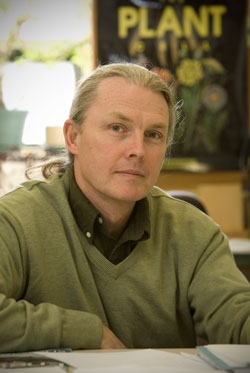
Professor C. Robertson McClung and his colleagues have identified a protein essential to the rockcress plant’s circadian rhythm. (photo by Joseph Mehling ’69)
On November 19, 2010, C. Robertson McClung, the Patricia F. and William B. Hale 1944 Professor in the Arts and Sciences, and his collaborators published an article in Proceedings of the National Academy of Sciences of the United States of America (PNAS).
In the article, the team identified a variant of the plant, Arabidopsis thaliana, commonly known as rockcress, in which the pace of the circadian clock is slowed down. According to McClung, the team “discovered that the slowed circadian clock results from a change in protein arginine methyltransferase 5 (PRMT5).” PRMT5, found in plants, fungi, and animals, including humans, normally modifies a diverse set of cellular proteins, including histones. “Histones interact intimately with chromosomal DNA, and components of the splicing machinery, which plays an essential role in the expression of the information encoded in DNA,” says McClung. “Thus, protein methylation by PRMT5 is implicated in the regulated expression of genes essential for proper circadian clock function.”
McClung and his co-authors will pursue further investigation of PRMT5 and circadian rhythms in collaboration with research groups in San Diego and Buenos Aires, Argentina.
